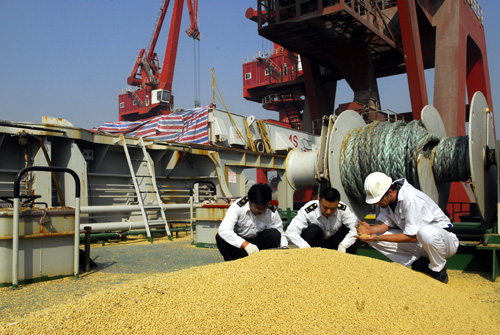|
 |
|
FOOD GUARDS: Quarantine officers take samples from imported soybeans to perform safety checks at Rizhao Port, east China's Shandong Province (FAN CHANGGUO) |
At the annual Central Economic Work Conference (CEWC), which was held in Beijing on December 10-13, China's leadership mapped out plans for the country's economic work in 2014, listing national food security as a top priority.
"The country is facing the twin pressures of a decrease in arable land and growing food imports. The formulation of a new food security strategy is crucial," said Dang Guoying, Director of the Office of Macroeconomic Research of the Rural Development Institute under the Chinese Academy of Social Sciences (CASS).
A statement issued after the meeting suggested that a national food security strategy based on strong domestic supply and moderate imports should be followed. Such a strategy will ensure China's production capacity while endorsing science and technology, according to the document, which also added that the country must focus on both the quality and quantity of agricultural products, the safety of foodstuffs, as well as supervision over production and the entire sales process.
"Ensuring there are sufficient supplies of safe and nutritious food is an important part of our national security strategy," said Li Wei, Director of the Development Research Center of the State Council, China's cabinet.
According to him, the three major economic security concerns of today's world are food, energy and finance. "The new national food security strategy introduced by the CEWC is a timely response to the international trend," Li said.
Domestic supplies
Strong domestic supply has always been stressed by the Chinese leadership as the best guarantee of food security. This year's CEWC reiterated the principle, but, for the first time, it specified that the country should achieve basic self-sufficiency for major grains while also guaranteeing the necessary quality and quantity of provisions.
According to the Medium- and Long-term Plan for National Food Security (2008-20) issued in 2008, the country should work to maintain a self-sufficiency rate of 95 percent.
In 2013, China's grain production hit 601.94 million tons, up 2.1 percent from 2012 and the 10th consecutive year of growth, according to data released by the National Bureau of Statistics last November.
"However, with increasing food imports, the hope for security brought by increasing grain yield has been dissolved," said Zhang Yuanhong, another researcher with the CASS' Rural Development Institute.
The General Administration of Customs reported that China's net imports of wheat, rice and corn amounted to 19 million tons in 2012. The number exceeded 11.43 million tons in the first seven months of last year. China is also likely to overtake Egypt to become the world's largest wheat importer in 2013. The National Grain and Oils Information Center predicted that the country's total imports of wheat would reach 6.5 million tons last year, compared to 3.68 million tons in 2012.
"The 95-percent red line necessary for food self-sufficiency has been crossed," Zhang warned. According to him, in 2012, China imported around 12 percent of the food it consumed.
Zhang believes that the fast-growing import of soybeans in particular has greatly contributed to the country's rising food imports.
As reported by Xinhua News Agency, China signed deals to import 26 million tons of soybeans from the United States between September 2013 and August 2014. By the end of last year, 12 million tons had already been shipped to China.
"The new idea put forward at this year's CEWC provides a solution to the pressure of rising food imports, especially imports of soybeans," said Hong Tao, a professor at the School of Economics of Beijing Technology and Business University.
According to him, food security is a general concept, including security for grains, beans and tuber crops. "Grains include rice, wheat and corn, while 'provisions' mainly refers to rice and wheat. According to the definition of the CEWC, maintaining self-sufficiency for rice, wheat and corn is enough," Hong said.
Zheng Fengtian, a professor at the School of Agricultural Economics and Rural Development of Beijing-based Renmin University of China, also welcomed with the CEWC decisions. "It makes the definition of food security more precise and scientific," Zheng said, adding that the removal of soybeans from the 95-percent range of self-sufficiency will allow for greater space for the government to focus on guaranteeing self-sufficiency for major grains.
| 